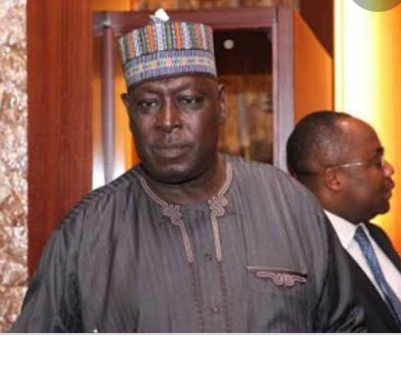By Olalekan Awojodu
Abuja
The trial of former Secretary to the Federal government(SGF), Babachir Lawal continued on Thursday with his lawyer, Akin Olujimi, SAN describing the telephone evidence brought before the court by the Economic and Financial Crimes Commission (EFCC) in the grass cutting contract as incriminating and unreliable.
The former Attorney General of the Federation who leads the Lawal’s defence team said that the phone tendered as evidence before the court may have been hacked.
The embattled ex-SGF and his co-defendants are being prosecuted by the anti-graft agency before the FCT High Court in Jabi, Abuja, on amended 10 counts of criminal conspiracy, fraud, and diversion of over N544million belonging to the federal government.
The defendants were accused of fraudulently converting the N544 million proceeds of the grass-cutting contracts which Mr Lawal, as then SGF, allegedly awarded to the companies in which he had interests.
The co-defendants in the matter are Hamidu Lawal, Suleiman Abubakar, Monday Apeh, and two companies – Rholavision Engineering Ltd and Josmon Technologies Ltd.
However, they all pleaded not guilty to the charges when they were re-arraigned on November 30, 2020, before the new trial judge Charles Agbaza, who was assigned the case after the first one died last year.
At the resumed trial, Fatima Umar, a deputy head of Digital Forensic Laboratory of the EFCC, who earlier gave her evidence-in-chief as the third prosecution witness in March, was cross-examined by Mr Lawal’s defence team.
Ms Umar’s evidence-in-chief and EFCC’s digital analyst tried to link Lawal to one Musa Bulani, whose roles in the transactions leading to the charges are not immediately clear.
According to her, while examining the iPhone 7 collected from Mr Bulani, she received a request from the anti-graft agency’s investigation team to search for deleted SMS, iMessages, phone logs, documents and any other item that could have been possibly deleted on the device.
She described how she used ‘manual and logical extraction’ to extract the deleted items, adding that she came across the name “SGF” using the cellebrite camera.
The results of the extraction, according to her, were burned into a CD using the HP workstation, printed out using the HP LaserJet Pro m402dn, and handed over to the investigators, she argued.
During a cross-examination, Olujimi suggested that the phone analysed by Umar could have been hacked and data implanted into it.
Although she admitted being aware of the activities of hackers on the internet and their ability to take over a third party’s device without physically touching it or obtaining the consent or authorization of the owner, but insisted that before a device could be hacked and data transferred into it using Bluetooth facility, pairing of devices must be achieved first. She said this ultimately meant that the owner of the device would have knowledge of the transfer.
Mr Olujimi also asked Ms Umar to confirm if there is a possibility of such pairing and subsequent transfer of data happening when the device is in the possession of another person without the knowledge of the owner.
She confirmed the possibility, but said it was not the case in the suit.
The defence lawyer noted that the phone which was taken from one Musa Bulani by one Ibrahim Ahmad, an EFCC’s operative in November 2017, did not get to Ms Umar until March 9, 2018.
He then asked Ms Umar to confirm the chain of custody of the device during the period and confirm if the phone was not tampered with and incriminating evidence planted in it during the period.
Responding, Ms Umar confirmed that the phone was in perfect condition when it was brought for data extraction and analysis, accompanied by consent, specific analysis and chain of custody forms.
Ms Umar said she had to interact with the owner of the phone as he needed to be brought to the laboratory because the phone had a pass code.
“He was brought to the lab because in the consent form which was supposed to know the state and information of the device, whether it had a password or not and in this case.
“In filling the form, he included a password that was wrong, so I requested him to be brought to give the correct password,” she explained.
Olujinmi, in response, pointed out that the evidence about the phone being passworded was not in any document tendered before the court.
The Defence counsel asked Ms Umar if she could hack into another person’s phone with her knowledge as a digital forensic expert. She answered in the affirmative, but added “not in this case.”
The matter has since been adjourned by the trial Judge, justice Agbaza till October 6 and 7 for cross-examination of the witness by the remaining four defence lawyers.
Dear readers, we really need your support to keep on serving you with authoritative, truthful, and juicy stories everyday. For your support, please reach out to the editor @gavelinternational66@gmail.com

